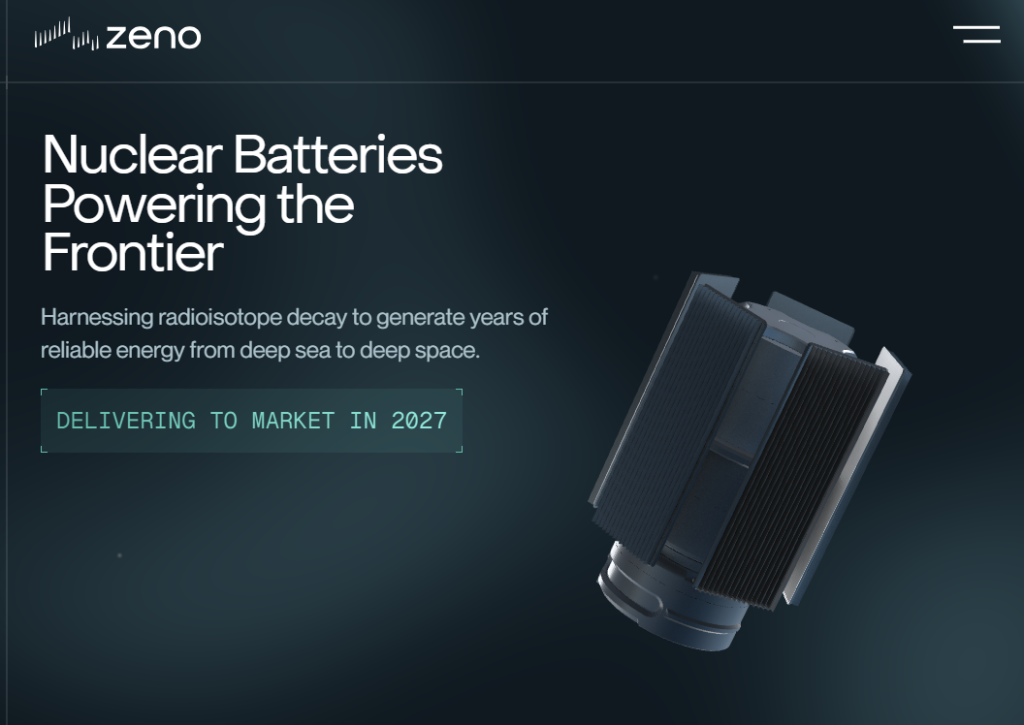Zeno Power Secures $50M Series B to Advance Space-Grade Nuclear Power Solutions
July 19, 2025
byFenoms Start-Ups

Zeno Power, a cutting-edge nuclear energy startup co-founded by Tyler Bernstein, has raised an impressive $50,000,000 in Series B funding. The round was led by Hanaco Ventures and supported by notable firms and institutions including Seraphim, Balerion Space Ventures, JAWS, Vanderbilt University, RiverPark Ventures, STAGE 1 VENTURES, 7i Capital, and Beyond Earth Ventures. This latest capital raise signals strong momentum for Zeno Power as it scales its mission to deliver safe, portable nuclear energy - especially for space and remote terrestrial applications.
Redefining Nuclear Energy for Extreme Environments
Zeno Power’s flagship innovation lies in Radioisotope Power Systems (RPS), a class of nuclear battery traditionally reserved for high-budget NASA missions. Zeno is democratizing this space-grade technology for broader commercial and government use.
The company’s core mission: provide consistent, off-grid energy for environments where traditional fuel and solar solutions fall short - think deep space, Arctic outposts, underwater robotics, and disaster relief zones.
Their proprietary technology converts the heat released by radioisotopes into electricity using thermoelectric generators - delivering long-term, maintenance-free power.
A Market Poised for Transformation
Nuclear innovation has re-entered the spotlight amid the global push for resilient, clean energy solutions. But Zeno is carving out a unique niche: low-power nuclear for extreme conditions.
This is not about powering cities, but enabling missions that are currently impossible due to energy limitations.
For instance, the U.S. military and space agencies are actively investing in R&D for off-grid nuclear solutions to power autonomous systems, satellites, and communication infrastructure in contested or inaccessible regions. According to a 2024 study by Allied Market Research, the global radioisotope thermoelectric generator (RTG) market is projected to reach $1.4 billion by 2032, growing at a CAGR of 10.2%.
Zeno is strategically positioned to lead this segment, bridging the gap between high-end R&D and real-world deployments.
Founder Vision: Replacing Limitations with Possibility
Co-founder and CEO Tyler Bernstein has been vocal about the mission-driven nature of Zeno Power. With a background in public policy and energy innovation, Bernstein is steering the company at the intersection of aerospace engineering, national security, and advanced materials science.
"We want to replace limitations with possibility," Bernstein shared in an earlier interview. "Our power systems can open entirely new frontiers - from permanent lunar installations to persistent Arctic monitoring."
This vision is gaining traction not just among venture capitalists, but also among defense contractors, space exploration firms, and research institutions.
Why This Round is a Turning Point
This $50M round represents a meaningful inflection point:
- Strong institutional backing from both private capital and research-driven entities
- Dual-use potential - Zeno’s tech serves both defense and civilian infrastructure
- Deeper R&D runway to refine systems for deployment in hostile environments
The funding will be used to:
- Scale manufacturing capabilities in the U.S.
- Expand partnerships with government agencies like NASA and DoD
- Secure regulatory approvals and safety certifications
- Launch pilot missions in both terrestrial and orbital contexts
Designing for Multipurpose, Multi-Market Use
Zeno Power is not only solving a hard technical problem; it’s addressing a key founder dilemma - how to prioritize go-to-market strategy in an emerging tech category. The startup's early roadmap offers insight. Rather than build for one vertical with a narrow set of requirements, they’ve positioned their product at the convergence of commercial innovation and public infrastructure gaps.
Here’s what’s crucial: Zeno aligned its engineering milestones with regulatory processes from day one, not as an afterthought. This alignment gave them early access to procurement opportunities, even while still in pre-commercial stages. Founders often underestimate the compounding benefit of synchronized compliance and roadmap development. Especially in deep tech sectors, this can mean the difference between multi-year delays and institutional traction in under 12 months.
Another differentiator? Zeno's decision to build a modular thermoelectric stack that can scale up or down depending on mission needs. This single architectural choice unlocked an entire portfolio of applications - from lunar bases to remote telecom relays - without needing new core designs. For early-stage teams building hardware, this lesson applies: flexibility is a feature, not a tradeoff.
The Emerging Market of Alternative Nuclear
While traditional nuclear startups focus on modular reactors or fusion breakthroughs, Zeno is part of a growing alternative nuclear cohort. These ventures aim to decouple nuclear energy from massive infrastructure, enabling mobile and flexible deployments.
Some recent developments in this space include:
- NASA’s 2024 announcement to deploy RTG-based power units on Mars rovers and orbiters
- DARPA’s funding of compact nuclear propulsion systems for satellites
- An uptick in VC interest in micro-nuclear reactors for rural and industrial sites
Zeno’s differentiated focus - powering missions, not megawatts - places it in an advantageous category of precision energy tech.
What Sets Zeno Apart
In a space full of scientific promises and decades-long timelines, Zeno stands out for:
- Regulatory readiness: Already working with U.S. regulatory bodies on safety certifications
- Scalable hardware stack: Thermoelectric platform built for replication
- Mission alignment: Partnerships with real-world deployment opportunities
Their ability to move quickly and test prototypes in actual field conditions is rare in nuclear and could position Zeno as a breakout leader in the next wave of energy innovation.
What’s Next for Zeno Power
Following this raise, Zeno plans to:
- Begin live testing of its power systems in simulated remote environments
- Hire across nuclear engineering, aerospace systems, and compliance
- Increase production throughput to meet growing demand from public and private partners
As geopolitical stability, climate resilience, and deep space ambitions all converge, Zeno Power’s vision - reliable energy anywhere - may be not just desirable, but essential.









